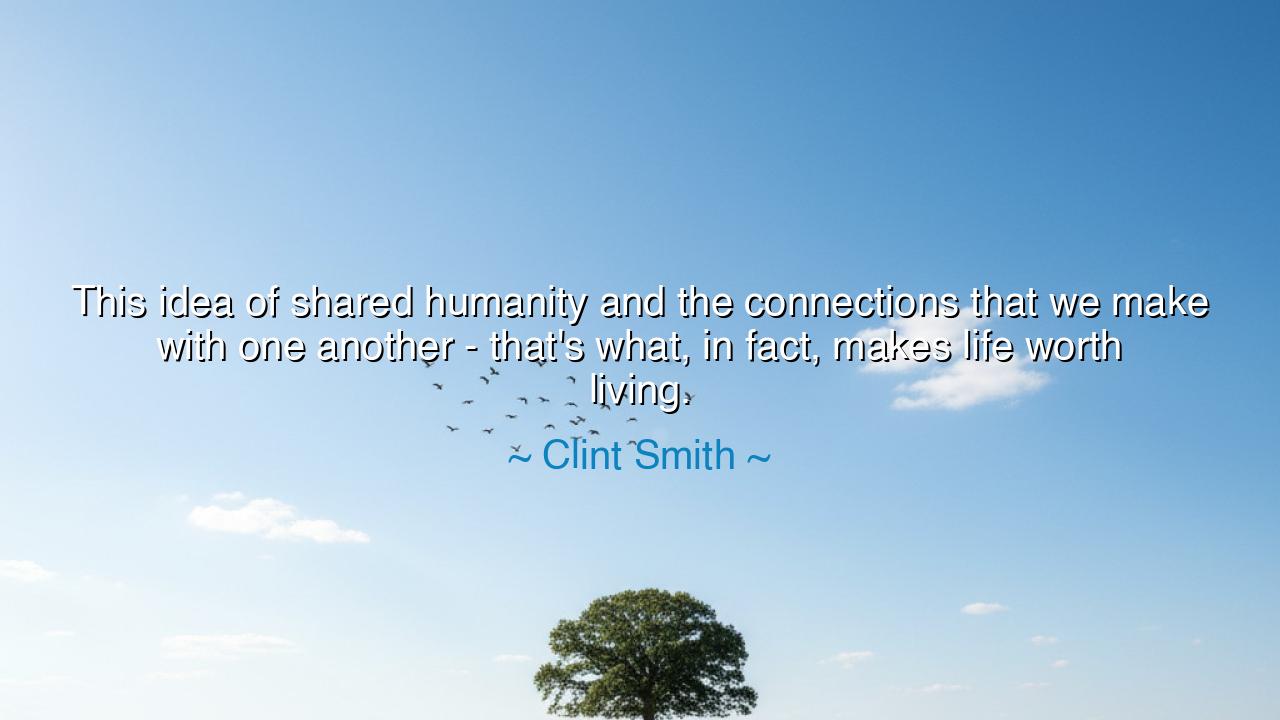
This idea of shared humanity and the connections that we make
This idea of shared humanity and the connections that we make with one another - that's what, in fact, makes life worth living.






The words of Clint Smith—“This idea of shared humanity and the connections that we make with one another—that’s what, in fact, makes life worth living”—speak with the force of eternal truth. They remind us that beneath the differences of race, nation, and creed, there runs a single current: the dignity of being human. To forget this is to descend into cruelty, division, and despair. To remember it is to live fully, with joy and meaning. For the wealth of life is not found in possessions or titles, but in the bonds we weave between hearts, in the connections that affirm we are not alone.
The ancients knew this truth. Aristotle called man a zoon politikon—a political, or social animal—meant to dwell not in isolation, but in community. The sages of Africa spoke of ubuntu, the philosophy that says, “I am because we are,” affirming that the self cannot be whole without others. The early Christians proclaimed that no man could claim love of God who did not also love his brother. In all ages, the wise have taught that shared humanity is the foundation of meaning, that fellowship is the highest wealth. Clint Smith’s words echo this chorus, calling us to see in each other the mirror of ourselves.
History gives us radiant examples. In the darkness of the Holocaust, prisoners in concentration camps—stripped of everything—shared crusts of bread, whispered songs, and held one another upright against despair. These small acts of connection gave strength when nothing else remained. Similarly, in the struggle for Civil Rights, Black Americans joined hands, sang hymns, and marched shoulder to shoulder. Their courage was not the strength of isolated individuals, but of a community bound together by the conviction of shared humanity. It was this bond, more than any weapon, that broke chains and toppled unjust laws.
Yet the opposite is also true: when men deny their shared humanity, catastrophe follows. The divisions of tribe and race have fueled wars, genocides, and slavery. In each case, the oppressor convinced himself that the other was not truly human, not worthy of dignity or connection. From this soil of dehumanization sprouted cruelty. Clint Smith’s words stand as both hope and warning: it is connection that makes life beautiful, and disconnection that breeds destruction.
But let us not think of connection only in times of suffering. Even in the daily course of life, it is the bonds we form that bring meaning. The laughter of friends around a table, the embrace of family after long absence, the kindness of a stranger offered at the right moment—these are the treasures that make existence luminous. A man may live in a palace and yet be miserable if he is alone; another may dwell in a hut but be rich in joy if surrounded by love. Thus, it is not the walls around us but the ties between us that determine whether life is barren or abundant.
The lesson is clear: nurture the bonds of shared humanity wherever you walk. Do not harden your heart against others, but see in them the same spark that burns in you. Offer kindness when you can, for it may be the thread that holds another’s life together. Build bridges, not walls; seek to connect, not divide. For in the end, it is not the victories of ambition, but the warmth of connection, that will comfort us in our final days.
Therefore, let us take Clint Smith’s words as a guide and a charge. Let us live with reverence for one another, cherishing the gift of human company. Let us build lives woven with compassion, friendship, and solidarity. For in the embrace of shared humanity, life finds its worth, and in the strength of connection, we discover that even in a broken world, joy is possible, love is real, and existence itself becomes a treasure worth living.






AAdministratorAdministrator
Welcome, honored guests. Please leave a comment, we will respond soon